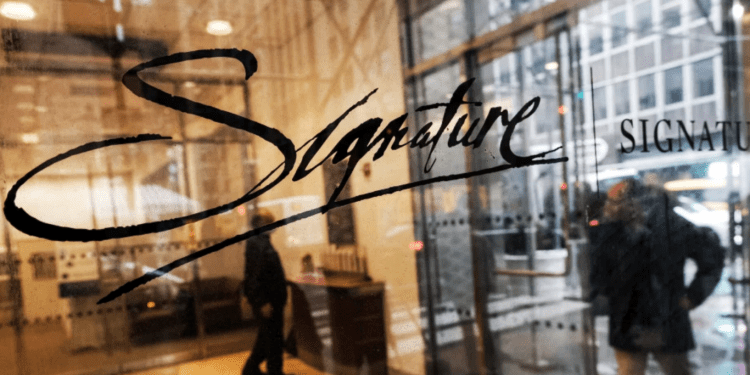- Signature Bank and its former executives have been sued by shareholders for alleged fraud.
- The bank has been accused of saying that it was “financially strong” just three days before the state regulator seized it.
- The New York-bsed bank assured investors that it was ready to handle “challenging times.”
Tuesday, March 14, saw a lawsuit against the New York-based Signature Bank and three former top executives by shareholders led by Matthew Schaeffer, who claimed the bank had committed fraud.
In the federal court in Brooklyn, a proposed class action lawsuit was filed against Signature and its former Chief Executive Officer Joseph DePaolo, Chief Financial Officer Stephen Wyremski, and Chief Operating Officer Eric Howell.
In a press release, The Rosen Law Firm, representing the bank’s shareholders, said that Signature Bank was charged with making false claims about its financial situation before its seizure on March 12. The plaintiffs bought shares of Signature Bank between March 2, 2023, and March 12, 2023. This covers people who sold put options and purchased call options from the bank.
The shareholders alleged that Signature had concealed the fact that it had been “susceptible to a takeover” by providing false or deceptive information regarding its state of health, perhaps to assuage fears raised by Silicon Valley Bank’s problems.
The lawsuit stated:
Signature Bank did not have the strong fundamentals that it represented itself as having in the days immediately before its takeover, or otherwise took action that left it susceptible to a takeover by the New York Department of Financial Services.”
In statements claimed that Signature could satisfy all client needs and had sufficient capital and liquidity to set itself apart from competitors in difficult times.
Joseph J. DePaolo, Signature Bank Co-founder and Chief Executive, said:
“We want to make it clear again that Signature Bank is a well-diversified, full-service commercial bank with more than two decades of history and solid performance serving middle-market businesses. We have built a strong reputation serving commercial clients through nine business lines and reached more than $100 billion in assets by continually executing our single-point-of-contact, a relationship-based model where banking teams are capable of meeting all client needs,”
Shareholders purport that owing to the defendant’s acts, the New York Department of Financial Services (DFS) targeted the New York Bank for regulatory action. The lawsuit claims that shareholders suffered damages when the factual information hit the market. The law firm urges all affected shareholders to join the class action lawsuit. The case is demanding unspecified damages from the bank.
The U.S. regulators decided on Sunday to fully compensate depositors of Signature Bank and Silicon Valley Bank, regardless of the balance in their accounts. The move increased public confidence in the banking industry and safeguarded the economy. However, the same protection won’t apply to shareholders.
About Signature Bank
Since its establishment in 1999, Signature has focused on real estate lending, offered a wide range of services to legal firms, and recently pushed for cryptocurrency deposits. Up until 2021, former president Donald Trump had been a client.
As the second-largest U.S. bank to fail since 2008, Signature finished 2022 with assets worth $110.4 billion and deposits worth $88.6 billion. The largest is Silicon Valley Bank which also collapsed over the weekend.
Before its demise, Signature had a market value of roughly $6.5 billion.














